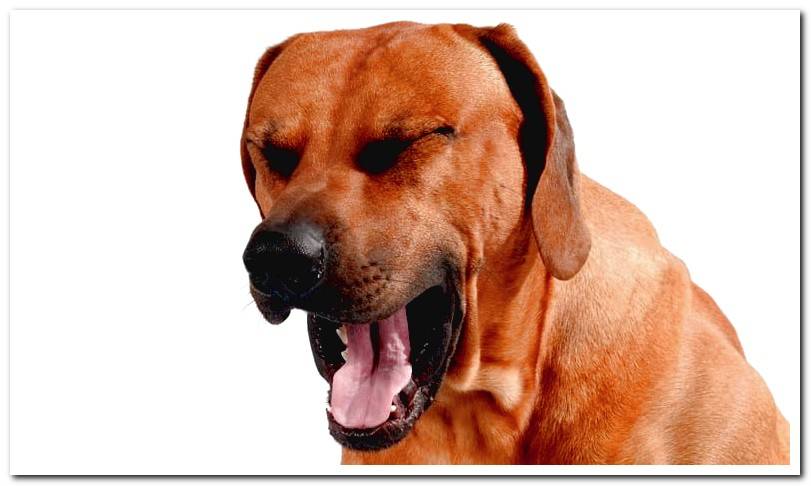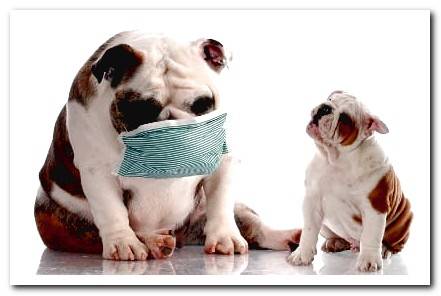
Popularly known as kennel cough is, more accurately, acute tracheobronchitis. Another name is the canine respiratory complex, since there are several diseases and viruses or bacteria that can be detected.
What they have in common is that they are all very contagious, so it is important that, if we identify any of the symptoms that we describe below, we immediately go to the vet.
- You may also like: Flu virus symptoms in dogs
Index of contents
- 1 What is kennel cough?
- 2 Which dogs get kennel cough?
- 3 Kennel Cough Symptoms
- 4 How is kennel cough treated?
- 5 Warning signs during illness
- 6 Treatment for kennel cough complications
- 7 Tips for homes with dogs sick from kennel cough
- 8 Can you prevent kennel cough?
What is kennel cough?
This nomenclature arises because it is a disease that is transmitted very quickly, so the places where more animals accumulate, such as kennels, constitute the perfect environment for its spread. And, how could it be otherwise, its characteristic symptom is cough.
There are several viruses and bacteria that can be identified in these cases. They can cause the disease in isolation or in combination. Among them, the bacteria Bordetella bronchiseptica and the canine parainfluenza virus stand out. Other pathogens are adenoviruses, herpesviruses, distemper and mycoplasma.

Which dogs get kennel cough?
Due to their high contagion capacity, the dogs with the highest risk of acquiring kennel cough will be those that live in animal communities. The kennels, of course, but also the protectors, the dog kennels or all those meetings of dogs like exhibitions or sports competitions, increase the danger.
Kennel Cough Symptoms
As its name already indicates, cough is the fundamental sign of this disease. Further, it is a very characteristic, dry, rough cough or, in other words, of “dog”. It is usually unproductive and it is not strange that it is accompanied by retching and nausea.
In general, this will be the only symptom and the dog will continue to do its daily life. He does not have a fever, eats normally and can carry out his usual activities. This is the way most cases go, since it is usual for kennel cough to be a mild disease.
How is kennel cough treated?
Although it is a mild process, due to the ease with which other specimens can be infected, we must go to the vet to establish a treatment. Normally, it is enough to keep the dog in a calm environment and ensure that it remains at rest, avoiding intense exercises or long walks.
Even so, healing may take a week or two. Antibiotics are usually prescribed for 7-10 days to avoid secondary bacterial infections that complicate recovery. In cases where the cough is very intense, antitussives can also be prescribed, but only in specific cases and, of course, according to veterinary prescription.
Warning signs during illness
It is not the most frequent but, sometimes, if the affected specimen presents certain conditions, the kennel cough will be aggravated. For example, dogs suffering from other diseases such as bronchitis or, in general, anyone who causes a decrease in their defenses.
Furthermore, in puppies the clinical course can also be complicated. These little ones will present other symptoms such as a runny nose. In them the treatment will be more complex because the mucus compromises breathing.
Therefore, it will also be necessary to take care of clearing the nostrils and preventing pneumonia, which is a lung infection that can also appear as a complication in mini or toy breeds. The pneumonia presents with symptoms such as the following and requires hospitalization:
- Fever.
- Anorexia, the animal stops eating.
- Depression.
- Productive cough.
- Runny nose.
- Exercise intolerance, that is, the dog will refuse to move or suffocate after minimal activity.
- Sneezing
- Accelerated breathing.

Treatment for kennel cough complications
In cases where the animal has a runny nose, it may be necessary to soften the mucus if it is very thick and makes breathing difficult. The vet can prescribe medication or at home we can put a few drops of saline in each nostril.
Water vapor can also make it easier for the nose to clear. We can do it at home by showering with very hot water with the door closed and the dog inside the bathroom. In this way we generate steam and we moisten the environment.
For its part, pneumonia will need continuous veterinary attention, so admission to the clinic is recommended at least for the first few days. In these cases, the treatment is administered intramuscularly.
Tips for homes with dogs sick from kennel cough
In addition to the treatment prescribed by the veterinaryn, which we must follow strictly and, very importantly, until its conclusion, even if the dog improves earlier, at home we can implement some measures that help the animal recover. They are as follows:
- Isolate the sick dog as much as possible to prevent the spread of the disease.
- Keep it in rooms with a pleasant temperature.
- Likewise, the home must be ventilated daily.
- The dog cannot get wet, neither baths nor rain, and if it does, we will have to dry it completely with towels and a dryer.
- Depending on the weather conditions, you may need to use a humidifier.
- The dog must continue to go outside for walks, but we must carry it on a leash and not exceed its duration or intensity.
- The affected specimen must not make any effort or rough games.
Can you prevent kennel cough?
There are vaccines against several of the agents that are involved in kennel cough. Some are included in the usual vaccination schedule, such as canine parainfluenza virus or some types of adenovirus. The former is incorporated into tri and tetravalent vaccines and the latter is found in the infectious hepatitis vaccine.
Thanks to the extension of vaccination, kennel cough cases have decreased and those that occur are milder. But there is still another vaccine that we can administer, especially if our dog is in a risk group. It is the vaccine against Bo
rdetella bronchiseptica, which is outside the usual schedule.
It is usually administered intranasally and can be combined with the parainfluenza vaccine in the same vial. It is recommended for dogs that go to residences, frequently visit veterinary clinics or dog grooming, participate in exhibitions, etc. It is necessary to revaccinate every 6-12 months.
